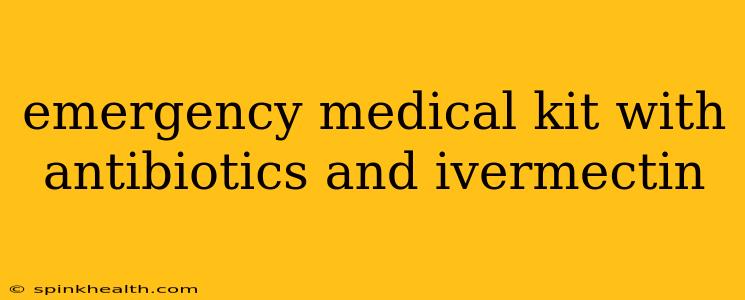Building Your Emergency Medical Kit: A Comprehensive Guide Including Antibiotics and Ivermectin
The unexpected can strike at any moment, leaving you vulnerable without a well-stocked emergency medical kit. This guide will walk you through assembling a comprehensive kit, addressing the specific questions surrounding the inclusion of antibiotics and ivermectin. We'll navigate the complexities of self-treating with antibiotics and the ongoing debate surrounding ivermectin's use outside of veterinary and specific medical contexts. This information is for educational purposes only and should not be considered medical advice. Always consult a healthcare professional for any medical concerns.
What should be in a basic emergency medical kit?
Before diving into the controversial additions, let's establish the foundation of a robust emergency medical kit. Imagine a scenario where you're stranded after a natural disaster, or face a sudden illness far from medical help. Your kit needs to cover immediate needs. Think:
- First Aid Essentials: Bandages (various sizes), antiseptic wipes, gauze pads, adhesive tape, pain relievers (ibuprofen, acetaminophen), anti-diarrheal medication, antihistamines, tweezers, scissors.
- Wound Care: Sterile gloves, antibiotic ointment (for external use only), burn cream.
- Personal Medications: A sufficient supply of any prescription medications you take regularly.
- Other Essentials: Water purification tablets or a filter, a whistle, a flashlight with extra batteries, a multi-tool or pocket knife.
This is the bedrock of your kit. Now, let's address the more complex additions.
Can I include antibiotics in my emergency medical kit?
This is a crucial question with significant implications. The short answer is: Proceed with extreme caution. Self-treating with antibiotics is dangerous for several reasons:
- Antibiotic Resistance: Misusing antibiotics accelerates the development of antibiotic-resistant bacteria, making common infections far more difficult to treat.
- Incorrect Diagnosis: You might incorrectly diagnose your illness, leading to ineffective treatment or even worsening your condition.
- Adverse Reactions: Antibiotics can cause serious side effects, ranging from mild allergic reactions to life-threatening complications.
If you are considering including antibiotics, it's vital to consult a physician beforehand. They can prescribe the right antibiotic for specific situations and provide guidance on safe usage. It’s far safer to have a plan in place to seek professional medical attention.
Should I include ivermectin in my emergency medical kit?
Ivermectin is a powerful antiparasitic drug, commonly used to treat certain parasitic infections in humans and animals. However, its use in treating or preventing COVID-19 or other viral illnesses has been extensively studied and is not supported by evidence-based medical research.
While you might encounter anecdotal claims suggesting its effectiveness against other conditions, using ivermectin outside of a doctor's prescription is risky. The potential for side effects, including liver damage and neurological problems, makes its inclusion in a general emergency medical kit questionable at best. Always follow the advice of a qualified medical professional before using any medication.
What are the potential risks of self-medicating with antibiotics and ivermectin?
The risks associated with self-medicating are significant and should never be overlooked:
- Delayed or inadequate treatment: Self-diagnosis can lead to delaying necessary professional medical care, which can have serious consequences.
- Adverse drug interactions: Mixing medications without a doctor's supervision can result in dangerous interactions.
- Harmful side effects: Antibiotics and ivermectin can have a range of side effects, some of which can be life-threatening.
Always prioritize seeking professional medical advice before using any medication, especially in an emergency. A well-prepared emergency kit should focus on immediate first aid and strategies for seeking help, rather than relying on potentially dangerous self-medication.
What are the alternatives to antibiotics and ivermectin in an emergency medical kit?
Instead of focusing on antibiotics and ivermectin, prioritize items that address immediate needs and aid in survival. Focus on first aid supplies, water purification, and methods to signal for help. Remember, your primary goal in an emergency is to survive and get help, not to self-treat complex medical conditions.
Building a well-stocked emergency medical kit involves careful planning and understanding of your own limitations. Consult with healthcare professionals to determine the most appropriate and safest contents for your specific needs. This guidance should reinforce the importance of prioritizing professional medical care in any serious situation.

